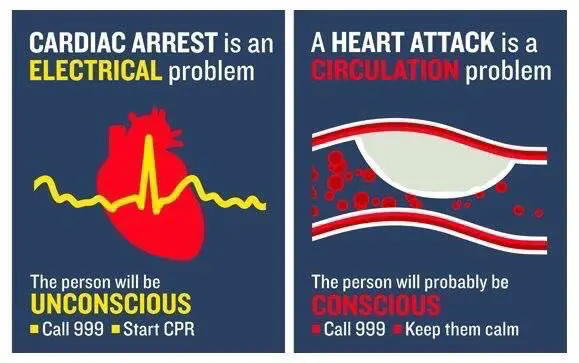Do You Know the Difference Between a Heart Attack and Cardiac Arrest?
We all know that cardiac issues can be dangerous and even life-threatening. However, it can be difficult to understand all of the terminology surrounding cardiac episodes. To make matters more confusing, some terms, such as “heart attack” and “cardiac arrest,” are often used interchangeably, even though they actually refer to different issues. You don’t need to become a master of all cardiac terminology, but it is helpful to understand the difference between these two terms so that you can have and share accurate information.
What is a heart attack?
Even if you have friends or loved ones who have experienced a heart attack, many of us still aren’t sure what that term actually means. To put it simply, a person experiences a heart attack when adequate blood flow is not getting to the heart. A heart attack is a circulation problem caused by a blocked artery. When an artery is blocked, oxygen and blood can no longer reach the heart. If the problem is not corrected in a timely manner, the heart cannot return to proper functioning.
During a heart attack, the heart does not normally stop beating. However, damage is occurring, and the damage is proportionate to the amount of time that passes before the patient receives treatment.
Since each person is different, the symptoms of a heart attack can also vary greatly. In most cases, the patient starts experiencing symptoms days or even weeks before a heart attack occurs. However, symptoms can sometimes appear quickly with little warning.
Some common symptoms of a heart attack include:
- Shortness of breath
- Discomfort in the chest
- Cold sweats
- Nausea and/or vomiting
- Back or jaw pain (especially in women)
What is cardiac arrest?
While a heart attack is the result of a heart circulation problem, cardiac arrest results from an electrical problem. Cardiac arrest is a life-threatening issue that is caused by an electrical malfunction in the heart muscle. Since the heart’s pumping action is disrupted by the irregular heartbeat, the heart stops pumping blood to the rest of the body, including the brain and lungs. Therefore, the person stops breathing and is unresponsive. Cardiac arrest can be caused by a heart attack. However, most heart attacks do not result in cardiac arrest.
Prompt treatment is vital to helping a patient survive cardiac arrest. The patient only has minutes for the cardiac arrest to be reversed through treatment. In most cases, cardiac arrest occurs suddenly with little to no warning. Usually, the first noticeable symptom is the fainting that results when the arrest occurs. However, some patients report experiencing these symptoms before cardiac arrest:
- Dizziness
- Heart palpitations
- Chest pain
- Shortness of breath
- Weakness
What should I do if I suspect a heart attack or cardiac arrest?
Fortunately, you do not have to distinguish between cardiac arrest or a heart attack to provide assistance. Calling 911 should always be your first move when you notice these serious symptoms.
Starting intervention before professional help arrives can often be the difference between an emergency and a tragedy. At In-Pulse CPR, we are committed to giving you the training you need to feel confident in administering CPR or utilizing an AED should the need arise. View available classes at www.inpulsecpr.com.



